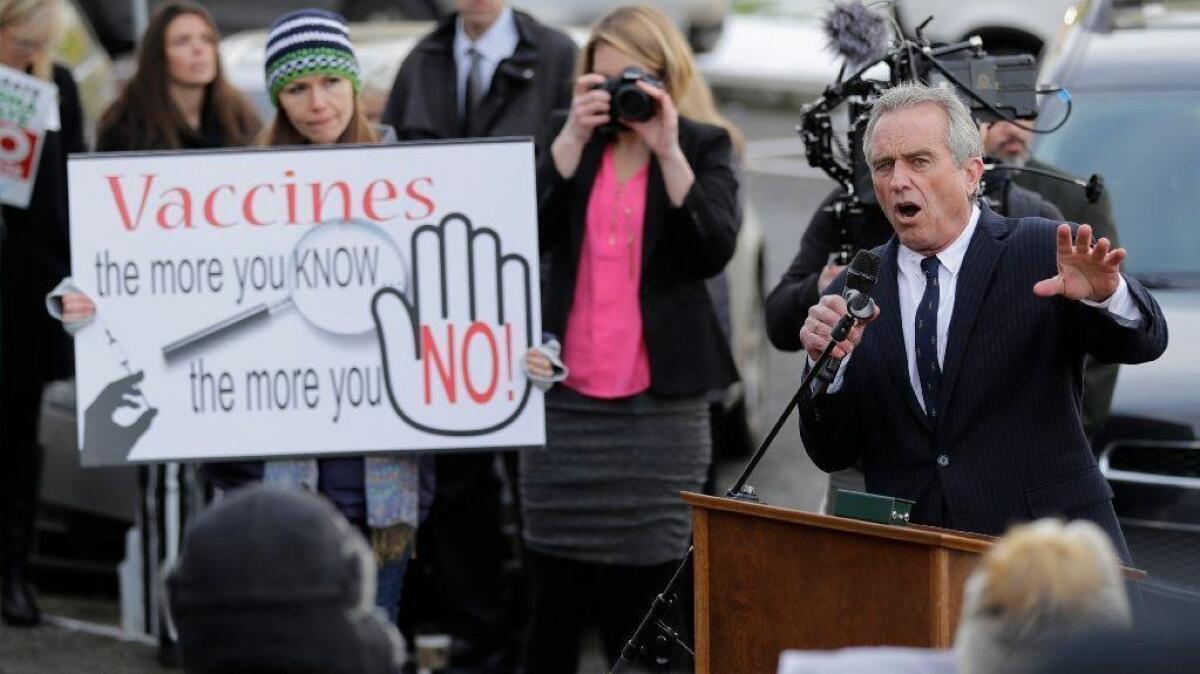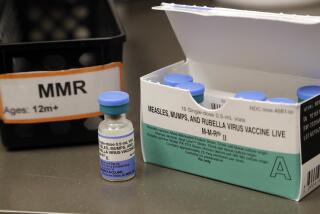Readers React: Why our brains are hard-wired for anti-vaccination hysteria, even if it harms us

To the editor: Anti-vaccination mania stems from a brain wiring issue that plagues our species. It involves the interaction between the amygdala, which is designed to protect us, and the frontal cortex, which is designed to keep the amygdala honest. (“Measles is deadly. Vaccines are not. We need our laws to reflect this reality,” Opinion, Feb. 10)
When the amygdala is activated by threats real or imagined, it triggers the release of adrenaline which, in turn, hinders or even blocks access to the frontal cortex. The amygdala wants us to react, not think. The downside of this necessary mechanism is how quickly irrational threats (especially when powerfully and cleverly packaged) can go viral. With adrenaline pumping, groupthink and confirmation bias quickly can kick in, and presto, the irrational becomes self-evident (think climate change denial, slavery and countless other examples).
In the face of any threat, a vigilant frontal cortex is essential, especially when that perceived threat is counter to scientific consensus. It’s not that science is never wrong, but for people to reject it, the the opposing evidence should be overwhelming, which is clearly not the case here.
A wise and wary frontal cortex knows all too well how wrong can feel so right.
Dale O’Neal, Laguna Beach
The writer is a clinical psychologist.
..
To the editor: It used to be people refused to vaccinate based on the unfounded and nonsensical claim of a correlation between vaccines and autism. Now, the notion of Big Pharma touting vaccines to make money would make me laugh if it did not have such terrible consequences.
Millions of people died from polio before Jonas Salk introduced the vaccine to eradicate that deadly disease in 1955. Salk refused to patent his discovery.
The Salk institute still thrives today, not as a big pharmaceutical company, but as a highly esteemed scientific research body that continues to make numerous life-saving discoveries without thought given to making money.
Those who choose not to vaccinate would be wise to become better informed. It just may save their children’s lives and those of others.
Sarah Turitto, Cardiff, Calif.
..
To the editor: The term “anecdotal evidence” is intended to be dismissive when used in a medical context. Vaccine injury cases are anecdotal in the same sense that instances of jackknifed semi trucks on the freeway are anecdotal.
No event is like another, so it’s difficult to generalize. But these events are certainly not to be dismissed, and they should influence policy.
The bar for compensation by the National Vaccine Injury Compensation Program is set very high. One family I know consisting of two lawyer parents spent years in the quest for compensation, and it was obvious to them that no family of ordinary means could manage that process.
Nevertheless, more than $4 billion has been disbursed by the program. Making light of vaccine injury undermines the message of vaccine advocacy.
Siegfried Othmer, Woodland Hills
..
To the editor: When I read about the scientific ignorance of anti-vaccination parents, I think of the days before the measles vaccine.
My sister and I were seriously ill with measles for about two weeks, and I clearly recall feeling like a wet noodle when I was finally able to get out of bed and walk around. My fever was so high that my parents were up in the night trying to cool us down with sponge baths.
I would be interested to read about the experiences and outcomes of the children who are ill right now, and I would like to hear from the adults who decided that their children didn’t need this protection.
Margaret Hamilton, Portland, Ore.
Follow the Opinion section on Twitter @latimesopinion and Facebook
More to Read
A cure for the common opinion
Get thought-provoking perspectives with our weekly newsletter.
You may occasionally receive promotional content from the Los Angeles Times.






